Is the UK at war with Yemen? RAF launches more airstrikes on Houthis in Red Sea - should Parliament vote?
and live on Freeview channel 276
UK and US forces have carried out a second round of air strikes on military sites used by Houthi rebels in Yemen.
The Foreign Secretary David Cameron said the fresh attack was designed to “send the clearest possible message” that firing missiles at cargo ships is “unacceptable”. This is the second strike on the Islamist group this month over the disruption to shipping lanes.
Advertisement
Hide AdAdvertisement
Hide AdRishi Sunak told the House of Commons that the latest military action was carried out "because we continue to see, including in intelligence, an ongoing and imminent threat from the Houthis to UK commercial and military vessels". He said the strikes were in "self defence" and were “limited to carefully selected targets with maximum care taken to protect civilian lives”.
Despite the initial intervention on 11 January, ships have continued to be targeted along the major global trade route that provides access to the Suez Canal. Downing Street said that at least 12 strikes have been carried out by Houthis since then. Many shipping companies have been forced to reroute cargo around South Africa, costing an estimated £1 million extra.
The Islamist group claims it began striking a narrow strip of sea between Yemen and east Africa, which is a key international trade route, in a bid to end Israel’s air and ground offensive against Hamas.
There will be further debate in the House of Commons tomorrow (24 January), however the Prime Minister's official spokesman said MPs would not be given a vote on action. The MoD said that four RAF Typhoons and a pair of Voyager tankers were involved in the latest military strike, which it said saw multiple targets hit at two military sites near the Sanaa airfield in Yemen. The department said that a “very rigorous analysis” was carried out to avoid civilian casualties.
Advertisement
Hide AdAdvertisement
Hide AdDefence Secretary Grant Shapps said: “Dangerous Houthi attacks on shipping in the Red Sea have continued to threaten the lives of sailors and disrupt shipping at an intolerable cost to the global economy. Along with our US partners, we have conducted a further round of strikes in self-defence.
“Aimed at degrading Houthi capabilities, this action will deal another blow to their limited stockpiles and ability to threaten global trade. Alongside our ongoing diplomatic efforts, we will continue to support regional stability across the Middle East, working hand in hand with our like-minded partners.”
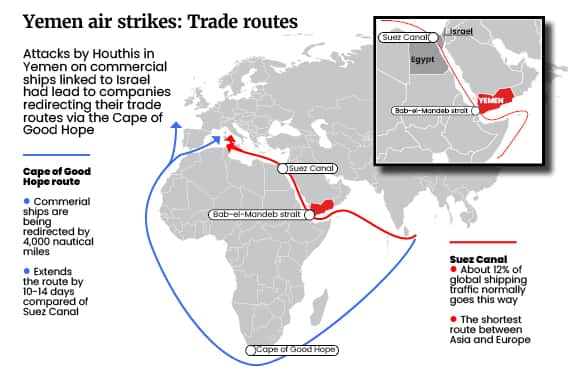

Is the UK at war with Yemen?
The Houthis are a Shia Islamist rebel group in Yemen, who control much of the west of the Middle Eastern country including the Bab al Mandeb Strait - a 16-mile stretch of water which marks the entrance to the Red Sea. Since 2015, Saudi Arabia and the United Arab Emirates have launched a bombing campaign on the Houthis in favour of the internationally recognised Sunni government. So the UK strikes yesterday evening were against rebels as opposed to the actual Yemeni government.
The definition of war, according to the International Committee of the Red Cross, is “when one or more states have recourse to armed force against another state, regardless of the reasons or the intensity of this confrontation. No formal declaration of war or recognition of the situation is required.”
Advertisement
Hide AdAdvertisement
Hide AdAlthough the Houthis aren’t the official Yemeni government, they do control large portions of the country - and thus this conflict could be described as war. The Houthis have claimed their attacks have been on Israel-linked shipping in the Red Sea in response to the country’s bombardment of Gaza since Hamas’ assault on Israel on 7 October.
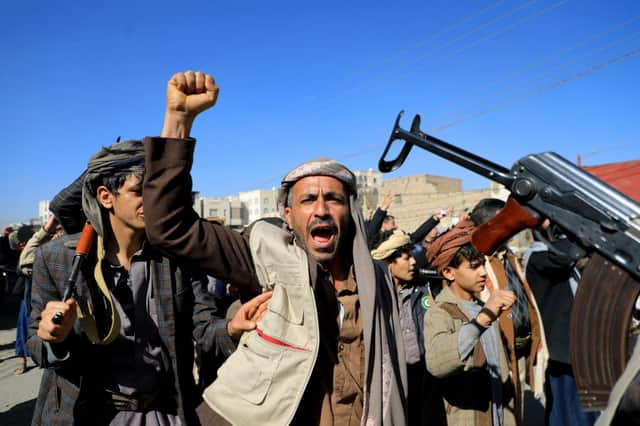

In his statement to the House, Sunak said: "I want to be very clear. We are not seeking a confrontation. We urge the Houthis and those who enable them to stop these illegal and unacceptable attacks.
"But, if necessary, the United Kingdom will not hesitate to respond again in self-defence. We cannot stand by and allow these attacks to go unchallenged. Inaction is also a choice."
A spokeswoman for the Prime Minister said the UK is not at war with the Houthis, reiterating the attacks were in "self defence". She added: "This was limited and targeted strikes in response to aggression. We acted in self defence in accordance with Article 51 of the UN Charter.”
Advertisement
Hide AdAdvertisement
Hide AdForeign Secretary Lord Cameron said UK armed forces would “continue to degrade” the Houthis’ ability to carry out attacks as long as their “completely indiscriminate” campaign of harassment in the Middle East continues.
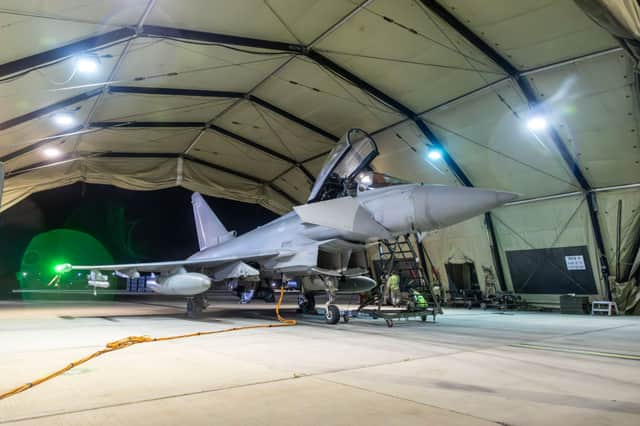

Should Parliament have voted on this action?
The deployment of British armed forces is a “prerogative power”, so it is entirely down to the Prime Minister and Cabinet, with advice from senior military figures. After the first strikes, Sunak did not put the air strikes to a vote in Parliament, however he did brief Labour leader Sir Keir Starmer and Shadow Defence Secretary John Healey.
At the time, the government said these were a one-off attack, however now there has been a second round of military action it is likely there will be more pressure on Sunak to call a vote. Starmer was only alerted after the 22 January air strikes due to reasons of "operational security", according to No10.
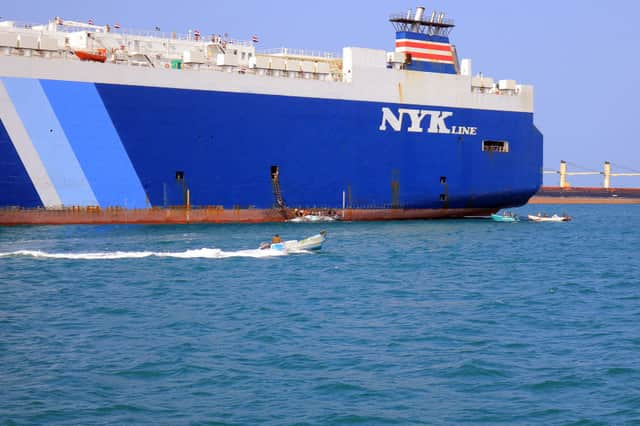

The Commons Library explains: “In constitutional terms Parliament has no legally established role and the government is under no legal obligation with respect to its conduct, including keeping Parliament informed.
Advertisement
Hide AdAdvertisement
Hide Ad“In practice however, successive governments have consulted and informed the House of Commons about the decision to use force and the progress of military campaigns, although there has been little consistency in how that has been achieved.
“Nor is the government under any constitutional obligation to abide by the result of any Parliamentary vote on military action, although in reality it would be politically difficult to engage in military action without Parliamentary support.”
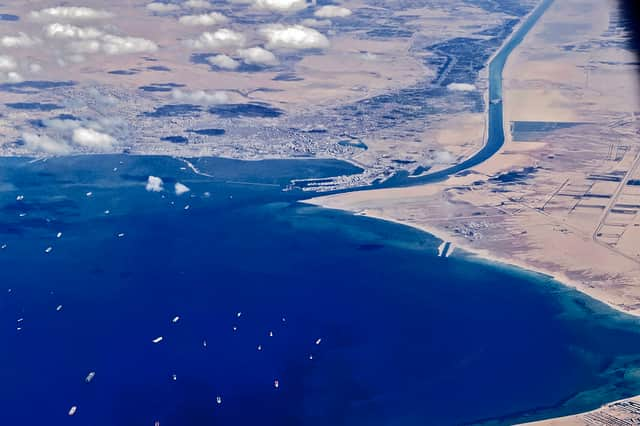

Since 2003 and the Parliamentary vote on the Iraq War, governments have adopted an unofficial convention of putting military action to the Commons unless it’s in the case of an emergency.
The Commons Library says: “The defeat of the government in a vote on military action in Syria in August 2013 was widely viewed as an assertion of Parliamentary sovereignty on such matters. Yet many have argued that the convention lacks clarity and remains open to interpretation and exploitation.”
Advertisement
Hide AdAdvertisement
Hide AdDowning Street confirmed there were no plans to hold a vote any time soon. Sunak's official spokesman said: “It’s important that parliamentarians are able to have their say but we are acting in line with precedence. The powers to make a decision on this action rest with the Prime Minister.
“There isn’t a requirement and, in line with previous strikes, we have not sought a parliamentary vote before acting. It’s important to note first and foremost the importance of ensuring safety of UK personnel and not doing anything to adversely impact operational security.”
Keir Starmer said Labour backs "this targeted action to reinforce maritime security in the Red Sea", but told the PM "while we do not question the justification for this action, it’s right that the House hears more about the effectiveness" of the strikes.
The Liberal Democrats have demanded a vote on the matter, and the SNP said any military action should be scrutinised in the Commons. Lib Dem foreign affairs spokesperson Layla Moran said MPs should not be “silenced” on the issue. “Parliament should not be bypassed. Rishi Sunak must announce a retrospective vote in the House of Commons on these strikes,” she said.
Advertisement
Hide AdAdvertisement
Hide AdRalph Blackburn is NationalWorld’s politics editor based in Westminster, where he gets special access to Parliament, MPs and government briefings. If you liked this article you can follow Ralph on X (Twitter) here and sign up to his free weekly newsletter Politics Uncovered, which brings you the latest analysis and gossip from Westminster every Sunday morning.
Comment Guidelines
National World encourages reader discussion on our stories. User feedback, insights and back-and-forth exchanges add a rich layer of context to reporting. Please review our Community Guidelines before commenting.
